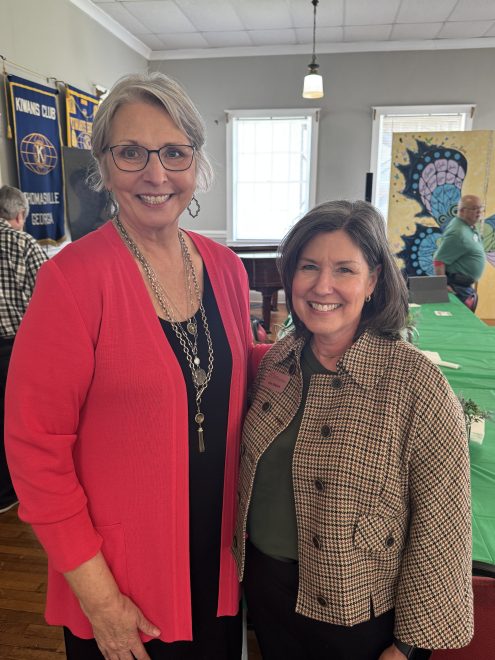Rotary Club hears from Georgia CORE director
Published 3:30 pm Monday, April 14, 2025

- ADVOCATING FOR CANCER PATIENTS EVERYWHERE: Rotary Club President Marta Jones- Turner with Georgia CORE CEO and President Lynn Durham. (Jill Holloway/The Thomasville Times- Enterprise)
THOMASVILLE- The Rotary Club of Thomasville welcomed Lynn Durham, Ed.D., President and CEO of the Georgia CORE, on Thursday afternoon, hearing about the organization’s ongoing efforts to reduce the burdens for cancer patients through research, education, and advocacy.
Durham, a three-time cancer survivor and mother to adult twins, cares deeply about improving cancer access and care for all.
Working with Georgia CORE, Durham’s goal was to ensure all Georgians had easy access to doctors and specialists and did not feel they had to travel to M.D. Anderson Cancer Center or Dana Farber Cancer Center to receive the treatment they needed.
“We wanted people to be able to stay in their support systems and receive great care,” she said.
Durham explained individuals across South Georgia are lucky to have numerous options when it comes to cancer treatment. They can utilize the facilities at Archbold, Phoebe, Tift Regional Medical Center, and South Georgia Medical Center.
“I’m very happy with the medical care down here in South Georgia,” she said.
As cancer is the second-leading cause of death in Georgia, with an estimated 66,000 new cases expected to be diagnosed in 2025, Durham and her team are working now more than ever to help the public understand the preventative measures they can take.
“There remains a disparity to access and screenings,” she said.
With a large uptick in the number of young, colorectal cancer patients, Georgia CORE is beginning a new, statewide campaign to help encourage screenings.
“You can begin screenings at 45,” she said.
The new campaign will share the signs and symptoms of colorectal cancer, with Durham sharing that if caught early, most colorectal cancer patients survive.
Some of the signs of colorectal cancer include blood in the stool, changes in stool, anemia, belly pain, excessive tiredness, unexplained weight loss, and shortness of breath.
“If those symptoms are happening to you or someone you know, please see a doctor,” she urged.
Despite a special emphasis on colorectal cancer, lung, breast, and prostate still top the list of cancers diagnosed in Georgia.
But, thanks to Rep. Lee Hawkins, Chair of the House Health Committee, a study committee has been assigned to study cancer care access. The committee will look at the Tobacco settlement funds Georgia receives to see how it can best be utilized to fund screenings and preventative measures, ultimately saving lives.
As the committee works toward a better use of funding, Georgia CORE continues to advocate for clinical trials, with Durham explaining she was alive today because of clinical trials someone took part in.
“We want to make sure these clinical trials are not just in Atlanta,” she said. “We know so many people do not want to come to Atlanta, so we are trying to get these across the state at different locations.”
Archbold is proudly one of the locations offering clinical trials, elevating cancer research. It is also one of the few locations partnering with Emory for blood cancer clinical trials.
To help patients find clinical trials that could potentially save them and others, Georgia CORE has developed a program known as Cancer Trial Finders.
“If God forbid, you found yourself with cancer and wanted to do a clinical trial, it can be hard to find, so Georgia CORE developed a clinical trial navigator,” Durham explained. “We can find out what your diagnosis is and find clinical trials throughout the state that could possibly work for you. We then match you with that hospital as close to home as we can.”
This is the first year of this pilot program, but Durham said it will be available for another year, as they continue to work out its details.
Georgia CORE has also worked to provide services for those who are concerned about getting cancer. Durham said their website provides a small survey individuals can take to see if they may have a predisposition for a mutation causing breast or ovarian cancer.
“It tells you if you need to see your doctor for further genetic testing,” she said. “We are testing women from all over with the Department of Public Health.”
Durham concluded by encouraging men and women to get screened, whether it be for colorectal, prostate, or breast cancer, reminding them if someone in their family had cancer, they need to be screened 10 years before the individual’s diagnosis.
“Reduce your cancer risks, go get screenings,” she ended.





